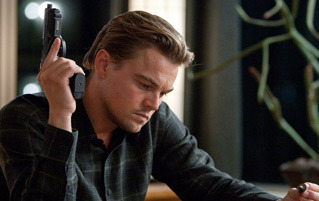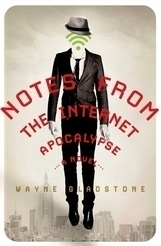4 Christopher Nolan Movies No Other Director Could Have Made

Writer/director Christopher Nolan has achieved a tremendous amount of critical and commercial success. He has helmed both celebrated art house films like Memento and major Hollywood blockbusters like the Dark Knight trilogy. Yet despite these accomplishments, his detractors remain -- people who not only dislike his work, but are violently repelled by it.

And yet everyone except Harlan Ellison and me seems to love this guy ...
From my perspective, a lot of this animosity comes from people who want to see a movie other than the one Nolan is intent on making. You'd have to look to directors like Stanley Kubrik or the Coen brothers to find filmmakers who possibly exhibit more aggressive control over their movies. People are entitled to dislike the art Nolan has created, but to suggest he has somehow screwed up seems simplistic. More often, it appears detractors are simply turned off by Nolan's desire to make viewers feel like his movies' protagonists. Over and over, Nolan creates filmgoing experiences that mirror the sensations and subject matter of his films. Here are four examples, of Nolan films where we, the audience, experience the film's universe in the same ways the film's star does. And while the point of this article, is not to solve any debates about the meaning of certain Nolan films, it does contain A TREMENDOUS AMOUNT OF SPOILERS. EACH SECTION OF THIS ARTICLE CONTAINS SPOILERS.
Memento was Christopher Nolan's first major theatrical release. It tells the story of Leonard Shelby, a man with a condition known as anterograde amnesia, as he conducts an investigation to determine who murdered his wife. Like most Nolan movies, the plot is difficult, and it is not the purpose of this article to explain "what really happened" in any of these movies. For example, if you Google "Memento, Who Killed Lenny's Wife" you will see no shortage of theories -- some contradictory but fairly well-supported, others palpably ridiculous -- but the point is that Nolan makes you work. He does not tie everything up in a neat bow for you, unless it's a Batman movie. But that's the point. We know he can. Sometimes, he opts not to. Why?
Well, in the case of Memento, Nolan set out to do more than tell a noir story about an amnesiac seeking vengeance; he wanted to give the moviegoer the feeling of Lenny's amnesia. Accordingly, adding to the already layered and demanding plotting, Nolan tells the story backwards. Yes, the movie starts at the end and works it's way to the beginning.

And if you sync the movie up with Pink Floyd's Dark Side of the Moon, it's, um, still backwards.
This backwards technique is more than just a cheap trick. Instead, it puts the viewer in the world of amnesia, receiving praise from medical experts in the process. Cal Tech neuroscientist Christof Koch called Memento "the most accurate portrayal of the different memory systems in the popular media." Clinical neuropsychologist Sallie Baxendale wrote that, "The fragmented, almost mosaic quality to the sequence of scenes in the film also reflects the 'perpetual present' nature of the syndrome."
In telling his neo-noir thriller, Nolan not only plots a story involving an amnesiac; he disturbs the audience's ability to process information. He creates a confused mental state, reflecting the main character's syndrome. We feel like Lenny.
The Prestige, a Film About Magic, Is a Magic TrickI know I'm not blowing anyone's doors off with that Memento entry. It's obvious that the movie's going backwards, and only the most obnoxious half-wits wouldn't think to ask why. But the thing is that it seems Nolan never stopped employing this trick. His films usually reflect their subject matter in the way they're told. Spielberg is a genius, but you know you're watching a Spielberg movie, whether he's talking about Abraham Lincoln or Private Ryan. Nolan, however, creates unique cinematic experiences reflecting his topics.
In 2006, Christopher Nolan asked the question "who would win in a fight: Wolverine or Batman?"

Weird. I always thought Batman was taller ...
Actually, the movie is about a rivalry between two magicians in 19th century England. Jackman becomes obsessed with Bale's "Transported Man" trick, an illusion in which Bale enters one closet and emerges from another closet across the stage almost instantaneously. Driven to compete, independently wealthy Jackman ultimately travels to Colorado Springs and employs a financially-strapped Nikola Tesla to create for him a machine that will actually accomplish the trick for real. If Tesla is to be believed, his machine almost gets it right. Instead of transporting something, it creates a copy of the original and transports that -- or perhaps transports the original while leaving a copy in its place.
When people talk about the end of the movie, it's funny how often they talk about this scene, in which Bale reveals how he did his trick. Apparently, he had an identical twin, and the two men were never seen in public together. While one was the magician "Borden," the other would wear makeup and live as his assistant "Fallon." Even their wife, girlfriend, and daughter didn't know the truth. Conversely, Jackman explains how each night, he risked death performing his trick, as one of his Tesla-generated doubles had to be murdered, and he never knew if he would be the one.
I always loved The Prestige, but that ending never really worked for me. I didn't like the idea of a Tesla magic box, or the reveal of the ending: a warehouse of 100 murdered Hugh Jackmans, one from each of the times he performed the trick and had to dispose of his freshly-minted double. Recently, my friend asked me if I were of the camp that believes Tesla's box didn't work -- that Tesla, in financial need, just put on a show to create the illusion it worked, and that Jackman was merely trying to convince Bale of the same. "Impossible," I said. "We see like 100 Jackmans in tanks." That was my memory. But my memory lied. I was tricked. The movie shows only one murdered Jackman (and we know that Jackman used a double in an earlier version of the trick). What's more, the very ending of the movie contains Michael Caine's narration, which explains how as we look for the answer to a trick, we're not really looking, because we want to be fooled.
I don't pretend to have every nuance of the plot nailed down, but I do know that Nolan, in creating a movie about illusion, pulled off an impressive trick himself by creating the false memory of 100 dead floating Jackmans where there was only one.
Inception, a Movie About Dreams, Creates Distorted Realities for the Viewer
Inception has been the subject of countless online debates that I'm not really going to get into here, because it's not the point of this article. Briefly: the movie deals with the ability to enter and alter people's dreams, even planting ideas into their subconscious.

Also, shit gets bananas.
But while Inception is about dreams, its presentation bears no resemblance to, say, the vaguely similar Dreamscape from the '80s, in which Dennis Quaid must enter the President's mind to protect him from a dream assassin. In that film, there is a distinct break between the real world and the M.C. Escher dream world.

Dream scene from Dreamscape. Not pictured: Kate Capshaw's sensational breasts.

Ah, there we go.
Anyway, without going into the whole layered and protracted plot of Inception, it's fair to say that the dreams get increasingly complex, until the viewer feels they are in a dream within a dream. Furthermore, Nolan chose real world locations that could also mirror surreal dream states, until the viewer reached the ending uncertain if the protagonist was alive, dead, or still dreaming. If the audience is asking these questions, then they too were part of that experience, unsure which scenes they saw were meant to represent hard reality vs dream states. We do not just watch a movie about a man becoming lost in the dream; we too become lost, and debate reality and fact versus fiction, which makes the protagonist's decision to stop caring about parsing reality and simply embrace his children more significant.
I loved Interstellar for many reasons, and unlike some friends of mine who said the film left them cold, I bawled through most of it. It took me a while to figure out why, but basically, Interstellar was a Doctor Who episode, but instead of being about a Time Lord who enters his TARDIS to save humanity, it's about an ordinary man who learns to be a Time Lord to save humanity. Cracked has previously described Interstellar as "Batman in outer space," but I feel that overlooks the learning portion of the film, which is at the forefront. Indeed, knowing what Nolan can do with action scenes if he wants to (Batman), the action in Interstellar is incredibly muted, and for a purpose.

For example, you can hardly see the giant space lizards in this clip.
Interstellar tells the story of an Earth that's quickly losing its ability to generate food and is suffering massive population loss. Society has embraced only the practical -- farming in place of science. Cooper, a former pilot/engineer, now a farmer, stumbles upon the remains of NASA, which asks him to go into space to find a suitable planet on which humanity can repopulate. While in space, he is relying on NASA to finish calculations that can solve the gravity problem, allowing vessels large enough to carry the remaining humans into space.
Nolan based the Interstellar script on the theories of physicist Kip Thorne. That was his starting point: science. And he actually never leaves it. Theory, not Cooper, is the star of Interstellar. The first act of the movie is dedicated to outlining theories of time and space and the potential to see gravity as another dimension that can be manipulated in our three-dimensional world. Yes, it establishes our hero, Cooper, but his main traits are that he believes in science and will take any chance given. We see him repurposing army robots as farm equipment. He is naturally curious and a staunch defender of science, and he passes those traits on to his daughter.
The rest of the movie plays out immaculately, as Cooper bravely battles not monsters, or even nature, particularly, but resistance towards his attempts to acquire more knowledge, until he literally throws himself into a black hole to acquire data. That is the heroic act of the movie: learning. And Nolan never takes the focus off the pursuit of knowledge. Even in the scene where 100-foot tsunamis bear down on our heroes, resulting in one character's death, my pulse barely moved.

Calm before the storm, but, y'know, even the storm was kinda calm.
That's not a complaint. If you've seen Inception or The Dark Knight, you know Nolan knows how to entice and excite an audience. Here, Nolan pulls back from the obvious bells and whistles of a space adventure to put the focus on theory. Cooper is a hero not because he battles a foe or even because he's exceptionally brave. He is our hero because he never loses faith in science, and we are exposed to the same science, learning it with him and seeing it executed in a way that eschews cheap thrills. He is our student surrogate.

GLADSTONE'S NOTES FROM THE INTERNET APOCALYPSE IS ON SALE NOW!NOW!
After experiencing the joy of purchasing Book 1 of the trilogy, be sure to follow Gladstone on Twitter.
Also, you can get all your Internet Apocalypse news here.
AND WATCH A NEW EPISODE OF HATE BY NUMBERS AND HELP GLADSTONE FUND MORE!
For more from Gladstone, check out The 4 Greatest Secret Movie Roles of Famous Actors. And then check out 32 Mind-Blowing Early Roles of Famous Actors.
Are you on reddit? Check it: We are too! Click on over to our best of Cracked subreddit.
